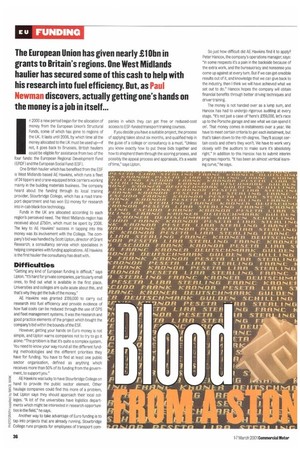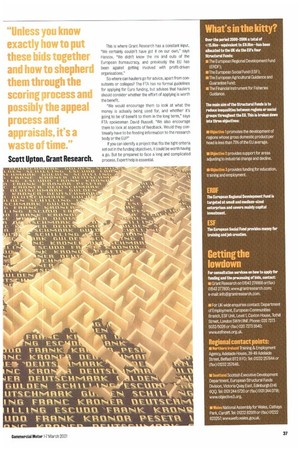The European Union has given nearly £10bn in grants to
Page 38

Page 39

If you've noticed an error in this article please click here to report it so we can fix it.
Britain's regions. One West Midlands haulier has secured some of this cash to help with his research into fuel efficiency. But, as
Newman discovers, actually getting one's hands on the money is a job in itself...
n 2000 a new period began for the allocation of money from the European Union's Structural Funds, some of which has gone to regions of the UK. It lasts until 2006, by which time all the money allocated to the UK must be used up—if not, it goes back to Brussels. British hauliers could be eligible for assistance from two of the
four funds: the European Regional Development Fund (ERDF) and the European Social Fund (ESF).
One British haulier which has benefited from the ESF is West Midlands-based AE Hawkins, which runs a fleet of 24 tippers and crane-equipped brick carriers working mainly in the building materials business. The company heard about the funding through its local training provider, Stourbridge College, which has a road transport department and has won EU money for research into in-cab black-box technology.
Funds in the UK are allocated according to each region's perceived need. The West Midlands region has received about nem, which must be spent by 2006. The key to AE Hawkins' success in tapping into this money was its involvement with the College. The company's bid was handled by Scott Upton, director of Grant Research; a consultancy service which specialises in helping companies with funding applications. AE Hawkins is the first haulier the consultancy has dealt with.
Difficulties
"Getting any kind of European funding is difficult," says Upton. it's hard for private companies, particularly small ones, to find out what is available in the first place. Universities and colleges are quite acute about this, and that's why they get the bulk of the money."
AE Hawkins was granted 1159,000 to carry out research into fuel efficiency and provide evidence of how fuel costs can be reduced through the use of GPS and fleet management systems. It was the research and good practice elements of the project which bought the company's bid within the bounds of the ESE.
However, getting your hands on Euro money is not simple, and Upton warns companies not to try to go it alone: "The problem is that it's quite a complex system. You need to know your way round all the different funding methodologies and the different priorities they have for funding. You have to find at least one public sector organisation, defined as anything which receives more than 50% of its funding from the government, to support you."
• AE Hawkins was lucky to have Stourbridge College on
• hand to provide the public sector element. Other g haulage companies could find this more of a problem, 27 but Upton says they should approach their local col
leges. "A lot of the universities have logistics depart ments which might be interested in research opportuni E ties in the field," he says.
es Another way to take advantage of Euro funding is to P tap into projects that are already running. Stourbridge 0 E College runs projects for employees of transport corn panies in which they can get free or reduced-cost access to ESF-funded transport training courses.
If you decide you have a suitable project, the process of applying takes about six months, and qualified help in the guise of a college or consultancy is a must. "Unless you know exactly how to put these bids together and how to shepherd them through the scoring process, and possibly the appeal process and appraisals, it's a waste of time," says Upton. So just how difficult did AE Hawkins find it to apply? Peter Hancox, the company's operations manager, says: "In some respects ifs a pain in the backside because of the extra work, and the bureaucracy and nonsense you come up against at every turn. But if we can get credible results out of it, and knowledge that we can give back to the industry, then I think we will have achieved what we set out to do." Hancox hopes the company will obtain financial benefits through better driving techniques and driver training.
The money is not handed over as a lump sum, and Hancox has had to undergo rigorous auditing at every stage. "It's not just a case of 'here's 2159,000, let's race up to the Porsche garage and see what we can spend it on'. That money comes in instalments over a year, We have to meet certain criteria to get each instalment, but that's taken down to the nth degree. They'll accept certain costs and others they won't. We have to work very closely with the auditors to make sure it's absolutely right." In addition to this Hancox has to submit interim progress reports. "It has been an almost vertical learning curve," he says.
This is where Grant Research has a constant input. "We certainly couldn't have got it on our own," says Hancox. "We didn't know the ins and outs of the European bureaucracy, and previously the EU has been against getting involved with profit-driven organisations."
So where can hauliers go for advice, apart from consultants or colleges? The ETA has no formal guidelines for applying for Euro funding, but advises that hauliers should consider whether the effort of applying is worth the benefit.
"We would encourage them to look at what the money is actually being used for, and whether it's going to be of benefit to them in the long term," says ETA spokesman David Russell. 'We also encourage them to look at aspects of feedback. Would they continually have to be feeding information to the research body or the EU?"
If you can identify a project that fits the tight criteria set out in the funding objectives, it could be worth having a go. But be prepared to face a long and complicated process. Expert help is essential.
































































































